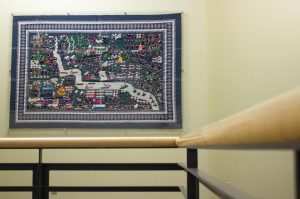Proposed policy threatens Hmong community
February 19, 2020
Oshkosh and Fox Valley area officials are speaking out against the Trump administration’s talks around deporting and repatriating Hmong and Lao residents.
The Fox Cities are home to a thriving Hmong community, and Wisconsin is home to the third largest Hmong population in the U.S., with approximately 47,000 Hmong refugees making the state their home over the last four decades.

Details from a paj ntaub, located in Reeve Union, based on the Hmong exodus from Laos to Thailand.
“Tens of thousands of Hmong families live and work in Wisconsin, and to consider separating them would have a devastating effect on communities in every corner of the state. These policies put our refugee and immigrant communities in harm’s way,” State Rep. Gordon Hintz, D-Oshkosh, said in a Feb. 12 press release.
“Any discussion with the Lao government on reintegration and deportation is deeply concerning,” Hintz said. “To engage in discussions with the Laotian administration which has a track record of human rights violations against the Hmong community is inexcusable.”
Aaron Wojciechowski, a UW Oshkosh alumnus and candidate for state Senate, said the move to deport and repatriate Hmong and Lao residents would be extremely damaging to our communities.
“We have businesses, local leaders, students who are in school right now who could be ripped apart from their families, and that scares me because it leads to a whole host of other problems,” he said.
The proposal could massively impact many Hmong Green Card holders, who are legal residents but not citizens of the U.S., but who have committed crimes or are facing deportation charges in the U.S.
“As you dig into it a little further, you understand that these are people who may have committed a crime 10, 15, 20 years ago, and served their punishment under the laws here and are now productive members of our community,” Appleton Mayor Tim Hanna said. “And now we’re going to turn around and just retroactively send them back to a country that, quite frankly, many of them are not familiar with.”
The Hmong culture centers around their support groups of extended families, or clans. Systematically taking people from their families and sending them back to a country where they know they’re not safe will have a ripple effect through the whole clan and the Hmong community, Hanna said.
“It just renders a lot of fear, and undoes a lot of what we’ve tried to accomplish in the last several decades,” Hanna said. “That is, to have our communities, and especially here in Appleton, make sure the Hmong not only just feel welcome here, but that they feel part of the community, because this is where they live.”
The Hmong people historically have not had a home. They are a people of migrations, as documented by paj ntaub (pan DOW’), the traditional Hmong tapestry.
The paj ntaub often includes depictions of a river. The Hmong have existed on either side of that river, the Mekong, at multiple times in their history, whether it be in Cambodia, Laos or Thailand.
“That’s who they are,” Hanna said. “And where they are today is here. This is the latest chapter of the Hmong story.”
Hanna said it’s important to recall why the Hmong made the U.S. their home. The Hmong forged bonds with and supported American troops during the Vietnam War era, and resisted the communist regimes in Cambodia, Laos and specifically in Vietnam. But, Hanna said, the reason for their settling in the U.S. is much more basic.
“It really goes back to they are really freedom-loving people,” Hanna said. “So much so that they were willing to risk their lives for that, and that risk led to them, as a people, being in great danger in Laos and in Cambodia.”
Since the Vietnam War, many Hmong people have emigrated to the United States. In that context, Hanna said, a policy that aims to systematically deport individuals to foreign lands seems out of place when their culture exists and is engrained here, in the U.S.
“Every culture has people who do things that are wrong,” Hanna said. “I think, ‘What if we had a system like this in place back in the early parts of the 1900s?’ We’d have been sending a lot of Italian people back to Italy and a lot of Irish people back to Ireland. It just doesn’t make any sense.”













